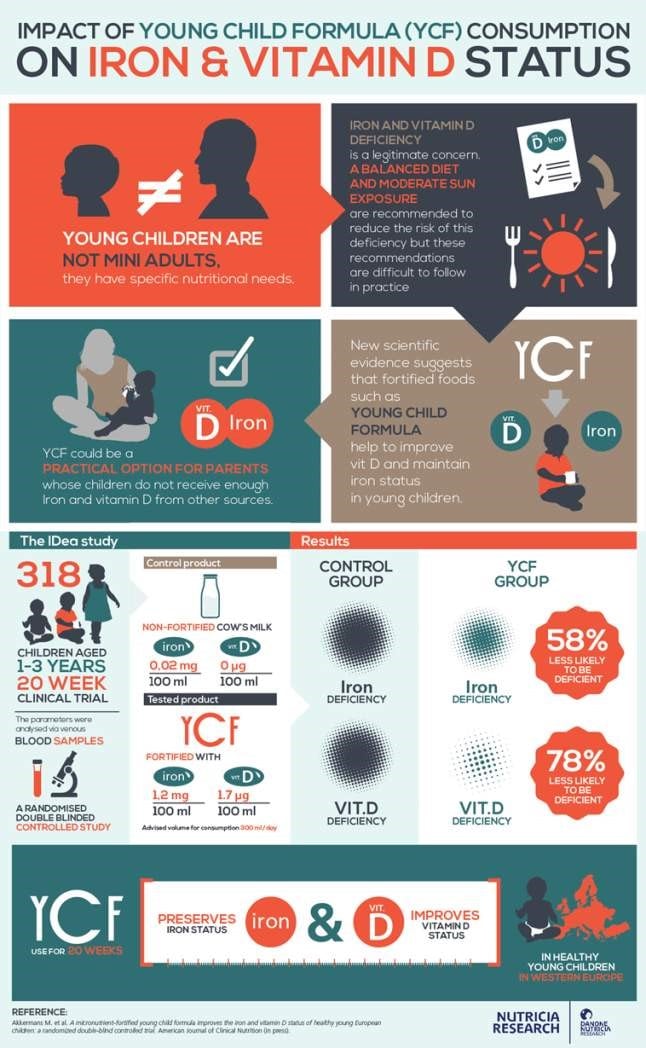The double-blind controlled trial, published in the American Journal of Clinical Nutrition, investigated the effect of micronutrient fortified milk (referred to as young-child formula or YCF) versus normal cows milk on the iron and vitamin D status of young European children.
Led by Marjolijn Akkermans from Haga Teaching Hospital in The Netherlands, the Danone-Nutricia backed study found daily consumption of milk fortified with 1.2 mg of iron per 100 mL and 1.7 mg of vitamin D per 100 mL resulted in significantly higher vitamin D and iron status among children, and reduced the risk of serious deficiencies.
“Micronutrient deficiency is a major public health problem that even in industrialised countries contributes to the global burden of disease,” said the team – noting that iron deficiency (ID) and vitamin D deficiency (VDD) “are among the most common micronutrient deficiencies in young children worldwide.
“Despite national nutritional recommendations, the iron and vitamin D intake of young children in Europe has been shown to often be insufficient in preventing ID and VDD,” they added – noting that such deficiencies can lead to anaemia and impaired brain development.
The team said that fortification of foods and drinks with micronutrients have been repeatedly shown to be an effective way to reduce the risk of potentially harmful deficiencies.
“Milk is a popular source for delivering fortification because of its wide availability and acceptance. However, randomised controlled trials investigating the effect of this strategy in young European children are scarce,” Akkermans and colleagues wrote.
RCT data
The Dutch researchers recruited 318 healthychildren aged between one and three years of age, to the study. The German, Dutch, and British children were randomised to receive either YCF (1.2 mg Fe/100 mL; 1.7 mg vitamin D/100 mL) or non-fortified cow milk (CM) (0.02 mg Fe/100 mL; no vitamin D) for 20 weeks.
Measures of iron and vitamin D status (serum ferritin and 25-hydroxyvitamin D) were taken at baseline and after 20 weeks.The team defined iron deficiency (ID) as a serum ferratin (SF) measure of less than 12 mg/L in the absence of infection, while vitamin D deficiency was defined as 25-hydroxyvitamin D [25(OH)D] of less than 50 nmol/L.
“We observed a modest increase in SF among the children who consumed YCF,” said the team – who revealed that difference in the change between the two groups was a 6.6 mg/L (95% CI: 1.4, 11.7 mg/L; P = 0.013).
Meanwhile the difference in change for serum 25(OH)D concentrations were found to be 16.4 nmol/L (95% CI: 9.5, 21.4 nmol/L; P , 0.001).
The team said that by the end of the 20 week study, children who received the fortified YCF were 58% less likely to be iron deficient and 78% less likely to be vitamin D deficient.

“To our knowledge, this is the first randomised, double-blind controlled trial to describe the effect of micronutrient-fortified YCF on both the iron and vitamin D status of healthy children aged 12–36 months in Western Europe,” said the team.
“The current recommendations state that CM is acceptable after the age of 1 year, although the iron and vitamin D intake in these children, including the use of vitamin D supplements, is insufficient for preventing ID and VDD,” they added. “YCF, as part of a toddler’s diet, could play a role in ensuring sufficient intake of certain micronutrients.”
Last year the European Commission said toddler or growing up milks did not require specific legislation - a position that pleased neither industry or NGOs at the time. EFSA in 2014 concluded nutritional benefits of most infant-targeted drinks did not exceed unfortified products.
Source: American Journal of Clinical Nutrition
Published online ahead of print, doi: 10.3945/ajcn.116.136143
“A micronutrient-fortified young-child formula improves the iron and vitamin D status of healthy young European children: a randomized, double-blind controlled trial”
Authors: Marjolijn D Akkermans, et al
